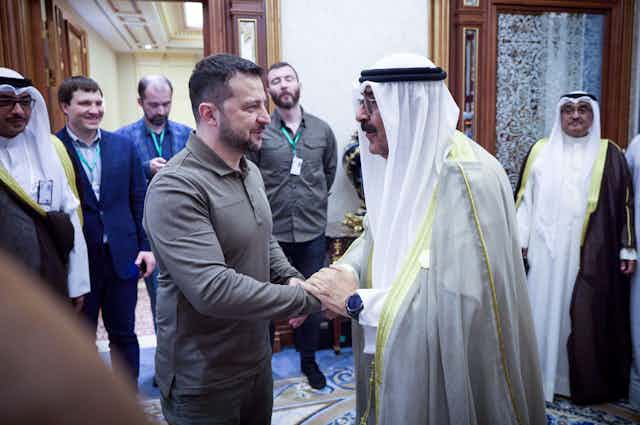As the war in Ukraine escalated on and beyond the existing battlefields with intensified air, drone and ground operations, more than 40 countries met in Jeddah, Saudi Arabia, over the weekend of August 5-6 2023, to discuss peace.
The talks in Jeddah were the latest effort to rally support behind Ukrainian president Volodymyr Zelensky’s ten-point peace plan, first presented at the G20 summit in Bali, Indonesia, on November 15 2022. Aimed at mobilising a global and diverse coalition of support, these efforts are not only about bringing this or that particular vision of peace to a war in the heart of Europe. Their deeper significance lies in the continuing shifts in the international order that they reflect.
No breakthrough joint declaration was reached in Jeddah. This is hardly surprising given that some 40 countries participated with very diverse views on the war, its causes and possible solutions. But the fact the meeting was attended, not only by the “usual suspects” among Ukraine’s western partners, but also by four of the five Brics members was highly significant. Brazil, India, China and South Africa all sent senior envoys. The fifth member of the bloc, Russia, was not invited.
The meeting in Jeddah followed an earlier one in Copenhagen at the end of June. Taking place at the same time as Yevgeny Prigozhin’s ultimately failed mutiny unfolded in Russia, the Copenhagen gathering was a more low-key affair without Chinese participation.
In Jeddah, China not only participated but also sent its Ukraine point man – the special representative of the Chinese government on Eurasian affairs, Li Hui. Li attended alongside US national security advisor, Jake Sullivan, and his Indian counterpart Ajit Doval. This is indicative of the importance that China and India – two key Russian allies among Brics – assign to these western-backed Ukrainian efforts to galvanise support for Zelensky’s ten-point plan.
Russia under pressure
That China remains engaged in, and supports, the continuation of discussions around Ukraine’s plan will be deeply worrying for Russia. The plan calls for the restoration of Ukraine’s territorial integrity, the complete withdrawal of Russian troops from all occupied Ukrainian lands, and a special tribunal to prosecute Russian war crimes.

In fact, commenting on the Jeddah meeting, Russia’s deputy foreign minister, Sergey Ryabkov, was only able to express an expectation that “a relevant exchange of views between us and the Brics participants who were there at different levels will be held”. This does not bode well for Russia, which will not be represented by Vladimir Putin, at the upcoming Brics summit in South Africa. Putin is subject to an arrest warrant issued by the International Criminal Court, which South Africa is bound as a signatory to execute.
Adding further to a sense of continuing marginalisation of Russia, even in formats such as the Brics, Moscow has also been subject to pressure from some of its traditional African allies over the war in Ukraine. An African peace mission to St Petersburg in June 2023, just before the Copenhagen meeting, yielded no success.
What’s worse for Moscow, a second Russia-Africa summit in St Petersburg on July 27 and 28 2023 was an almost unmitigated disaster for Putin. The Russian president’s justifications for abandoning the Black Sea grain deal fell on deaf ears among the significantly lower number of African leaders who even bothered to attend the gathering.
Different drivers, one outcome: a changing world order
But at the same time, it is important not to overestimate the momentum that appears to be slowly building behind Zelensky’s western-backed peace plan. Proposals for a ceasefire to be followed by negotiations, like that suggested by Indonesia’s defence minister, Prabowo Subianto, at the 2023 Shangri-La dialogue in early June, remain on the table.
They may not get traction in Kyiv or western capitals, but they are mirrored in similar efforts, including by the Vatican and the group of African leaders who travelled to Kyiv and St Petersburg in June on a peace mission of their own.
Above all, China has not given up on its peace plan either. Beijing’s “Position on the Political Settlement of the Ukraine Crisis”, like the Indonesian, African and Vatican proposals, also prioritises a ceasefire over the restoration of Ukraine’s territorial integrity. And Beijing is unlikely to change its stance in this regard until something more compelling emerges that would serve China’s own interests better in becoming a major player in a new Eurasian, and global, security order.
This highlights a deeper meaning to the summit. It’s not merely the various different peace plans on the table. But the emergence of a variety of coalitions pushing for different visions of a peace settlement is also of huge significance. This ultimately reflects – and will determine – the nature of the new international order that is emerging.
The meeting in Jeddah, inconclusive as it may have been, signals a continuing shift in Ukraine’s favour, albeit at glacial speed. This is driven by the self-interests of those involved, be it African food security, Chinese great-power ambitions, or Saudi middle-power aspirations.
All of these and other players may agree with Ukraine and its western partners “that respect for Ukraine’s territorial integrity and sovereignty should be at the heart of any peace settlement”. But this should not be mistaken for a reaffirmation of a US-led international order. If anything, it is another indication of its replacement which will be decided both on the battlefield in Ukraine and at a future negotiation table.

